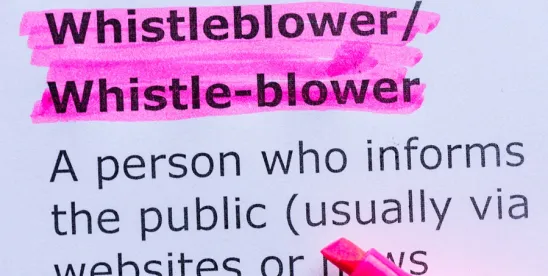Today, the U.S. Department of Justice unveiled the framework for its new whistleblower award program focused on compensating whistleblowers who report financial frauds resulting in asset forfeitures.
Stephen M. Kohn, founding partner of Kohn, Kohn & Colapinto and Chairman of the Board of Directors of the National Whistleblower Center, stated:
“The DOJ missed the target. They failed to follow the proven best practices of the Dodd-Frank and False Claims Acts by not making awards mandatory to qualified whistleblowers who risk their jobs, careers and even lives in the public interest.”
“Whistleblower rights must be enforceable, not left to the whims of political officials and special interests. All prior discretionary programs have failed due to inherent prejudices against whistleblowers. Given the failure of the DOJ program to require awarding compensation to fully qualified and courageous whistleblowers, this program will likewise fail.”
“In addition to denying whistleblowers any enforceable right to obtain an award, the program places severe restrictions on whistleblowers who may have participated in the misconduct. This denies coverage to the vast majority of informants who have the best information documenting fraud. It fails to follow the wisdom of the False Claims Act, signed into law by President Abraham Lincoln in 1863. The drafters of the False Claims Act understood that awards were necessary to induce insiders, who may have participated in the frauds, to turn on their fellow fraudsters.”
“Whistleblowers should not solely rely on this new program because of its significant defects. They should instead continue to utilize the highlight effective, Congressionally-authorized, whistleblower protections afforded in the AML Whistleblower Improvement Act, Securities Exchange Act, Commodities Exchange Act, Foreign Corrupt Practices Act, IRS tax whistleblower law, and False Claims Act.”
Given the significant potential of the new program to assist in the detection and prosecution of fraudsters, the National Whistleblower Center and its whistleblower-law experts are requesting a meeting with the Attorney General and Deputy Attorney General to explain how the current framework of the DOJ program is highly problematic and to outline what reforms are necessary to have it comport with the effective procedures in other whistleblower award laws, such as Dodd-Frank and the False Claims Act.
Based on the Department of Justice’s framework of the program, below is a scorecard tracking the inclusion of proven best practices:
|
Best Practice
|
Included in DOJ Program?
|
|
Consistent with Highly Effective Dodd-Frank Act
|
NO
|
|
Confidentiality Guarantee
|
NO
|
|
Anonymity Guarantee
|
NO
|
|
Mandatory Award
|
NO
|
|
Minimum 10% Award
|
NO
|
|
Maximum Award Not Less than 30%
|
NO
|
|
Dedicated Whistleblower Office
|
YES
|
|
No Blanket Exclusion for Participants in Misconduct
|
NO
|
|
No Blanket Exclusion for Minimally Culpable Whistleblowers
|
NO
|
|
Program Consistent with U.S. Strategy on Countering Corruption
|
NO
|
“The program gets a grade of 10%, a failing grade,” Kohn added.
During the DOJ’s 90-day sprint to develop the program, Kohn met with the DOJ team which drafted the program and submitted written comments to the DOJ during its policy sprint. He also wrote a number of articles outlining what the DOJ would need to do in order for the program to be a success.




 />i
/>i

